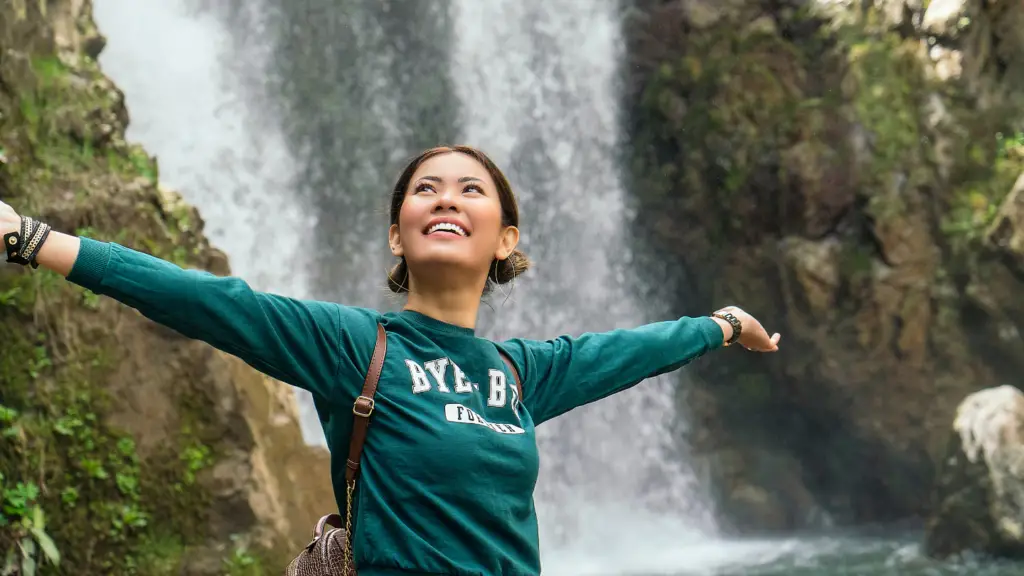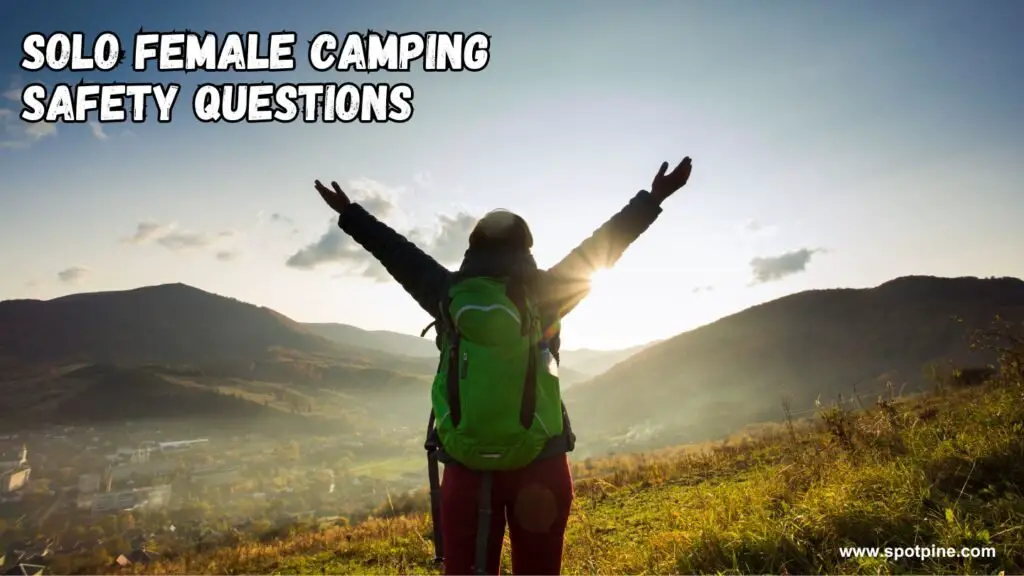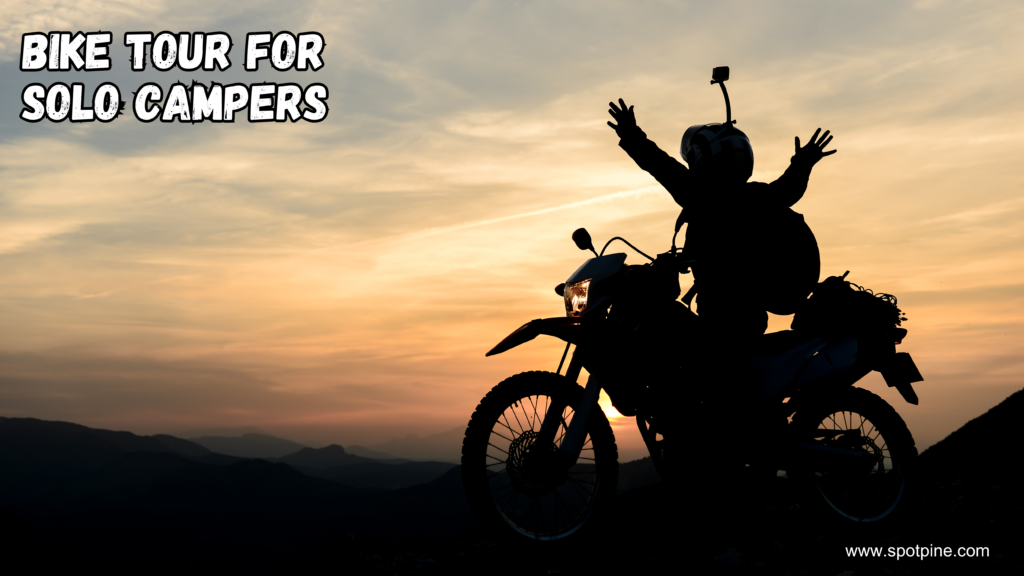Enjoy a safe solo camping trip as a female by informing someone of your plans and trusting your instincts. Exploring the great outdoors alone can be a rewarding experience, but safety should always be a top priority.
For solo female campers, taking extra precautions and being well-prepared can make a significant difference in ensuring a safe and enjoyable trip. From knowing essential camping activities like navigation and setting up camp to packing necessary gear and being aware of your surroundings at all times, this guide will provide valuable tips and insights to help you stay safe while embarking on a solo camping adventure as a woman.
Let’s dive into the essential safety considerations for female campers venturing out into the wilderness alone.
1. Solo Female Camping Safety Questions
Embarking on solo female camping raises safety questions to consider. Ensure you notify someone of your whereabouts and trust your instincts during the trip. It’s crucial to pack essentials, be aware of surroundings, and equip yourself with camping skills for a secure experience.
1.1 Is It Safe For A Female To Camp Alone?
There is no reason why you can’t enjoy a solo camping trip as a female. Just be sure to let someone know where you’re going and when you’ll be back, and always trust your gut instinct if something doesn’t feel right.
1.2 Is Solo Wild Camping Safe?
If this is your first time wild camping alone, it is important to stay aware of your surroundings at all times, pack wisely for any contingencies that may arise during your trip, and bring along a well-stocked first aid kit just in case something does go wrong.
1.3 What Are Some Safety Tips For A Girl Going Camping?
- Always let someone know where you are going and when you will be back.
- Trust your gut instinct and don’t hesitate to leave if something doesn’t feel right.
- Stay aware of your surroundings at all times.
- Research the potential dangers of the area you plan to camp in.
- Pack wisely, including essentials such as a tent, sleeping bag, and first aid kit.
- Learn basic camping skills like pitching a tent, building a fire, and handling encounters with wildlife.
- Consider taking self-defense classes or carrying personal protection devices if it makes you feel more secure.
1.4 Wild Camping Alone – Is It Safe For Women?
While solo wild camping can be safe for women, it is important to take necessary precautions. Stay vigilant, pack smart, and familiarize yourself with camping and outdoor safety practices. Trust your instincts and be prepared for any possible situations that may arise during your camping adventure.
2. Essential Tips For Solo Female Camping Safety
Going solo camping as a female can be a safe and empowering experience. It’s important to let someone know your plans and trust your instincts. Learn essential skills such as pitching a tent, building a fire, and handling wildlife encounters to enhance your camping safety.
2.1 Notify Someone Of Your Camping Plans
Share your camping itinerary with a trusted person before heading out.
2.2 Trust Your Instincts
Listen to your gut feeling and react promptly if anything seems off.
2.3 Learn Important Solo Camping Activities
Master skills like navigation, tent pitching, fire building, water sourcing, camp setup, and wildlife encounters.
2.4 Pack Necessary Equipment And Gear
Essential items include tent, sleeping bag, first aid kit, lighting, weather-appropriate clothing, and waste disposal tools.
2.5 Stay Aware Of Your Surroundings
Stay vigilant at all times, especially if camping in unfamiliar or secluded locations.
2.6 Be Familiar And Comfortable With Camping
Make sure you are well-versed in camping basics and feel at ease in outdoor settings.
2.7 Stay Overprepared
Bring extra supplies and gear to handle unexpected situations effectively.
2.8 Avoid Mentioning Your Solo Camping
Keep your solo camping status discreet to minimize unwanted attention or risks.
3. Safety Measures For Solo Female Campers
When it comes to solo female camping, safety is a top priority. Taking the necessary precautions and being well-prepared can make the experience enjoyable and worry-free. Here are the essential safety measures for solo female campers:
3.1 Protecting Personal Safety
Protecting personal safety is crucial when camping alone. Here are some important tips:
- Share your camping location and itinerary with a trusted person.
- Trust your instincts and be cautious when interacting with strangers.
- Carry a personal safety alarm or whistle for immediate assistance.
- Ensure your mobile phone is fully charged and have emergency contacts saved.
3.2 Ensuring Campsite Security
Ensuring campsite security is essential for a safe camping experience:
- Choose well-lit and populated campsites for added security.
- Lock your belongings and keep valuables out of sight.
- Set up camp in an area with good visibility and clear escape routes.
- Be mindful of your surroundings and report any suspicious activities to authorities.
3.3 Handling Encounters With Wildlife
Encountering wildlife is a possibility when camping. Here’s how to handle it:
- Store food in airtight containers and away from the camping area to deter wildlife.
- Learn about local wildlife and their behaviors, and adhere to safety guidelines provided by park authorities.
- Carry bear spray or other wildlife deterrents for added protection.
- If encountering wildlife, remain calm, back away slowly, and do not run.
3.4 Carrying A Well-stocked First Aid Kit
Having a comprehensive first aid kit is a must for solo female campers:
- Include essential items such as bandages, disinfectants, pain relievers, and medical supplies for any specific health needs.
- Regularly check the kit for expiration dates and restock as needed.
- Attend a first aid training course to enhance your knowledge and confidence in dealing with emergencies.
- Keep the first aid kit easily accessible in case of injuries or medical incidents.
4. Choosing The Right Camping Spot
When planning a solo female camping trip, selecting a safe camping spot is crucial. Being proactive about your safety can help ensure a worry-free experience. Here are essential tips to consider when choosing the right camping spot.
4.1 Research Campgrounds And Locations
Before embarking on your solo camping adventure, take the time to research campgrounds and locations. Look for areas that are known for being safe and well-maintained, with positive reviews from previous campers.
4.2 Look For Well-populated Camping Areas
Opt for well-populated camping areas where you’re more likely to encounter other campers. This can provide a sense of security and support in case of any unexpected situations.
4.3 Consider Safety Features And Amenities
When choosing a camping spot, prioritize safety features and amenities. Look for areas with good lighting, secure facilities, and proximity to park rangers or campsite management for added peace of mind.
4.4 Check Online Reviews And Recommendations
Check online reviews and recommendations from fellow campers to gather insights into the safety and overall experience of various camping spots. This can help you make an informed decision before selecting a location.
4.5 Trust Your Intuition When Selecting A Spot
Lastly, trust your intuition when selecting a camping spot. If something doesn’t feel right or if you have any doubts about a particular location, it’s best to move on and find a spot where you feel comfortable and secure.
5. Self-defense And Emergency Preparedness
When embarking on a solo camping trip, being prepared for self-defense and emergencies is crucial. Here are the key aspects to focus on:
5.1 Learn Basic Self-defense Techniques
Being equipped with basic self-defense skills can empower solo female campers to feel more confident and secure. Consider taking a self-defense class to learn vital techniques for protecting oneself.
5.2 Carry Personal Safety Devices
Carrying personal safety devices, such as a whistle, pepper spray, or a personal alarm, can provide an added layer of security in case of a threatening situation. These small, easy-to-carry items can offer peace of mind while camping alone.
5.3 Have Emergency Communication Tools
Always have reliable means of emergency communication, such as a fully charged mobile phone, a portable charger, and a list of emergency contacts. Additionally, consider carrying a two-way radio or a satellite messenger for areas with limited cell reception.
5.4 Plan For Unexpected Situations
Part of being prepared for emergencies is planning for unexpected situations. This includes having a well-stocked first aid kit, knowledge of basic first aid procedures, and being aware of the nearest medical facilities or emergency services in the camping area.
5.5 Know How To Navigate In Case Of Emergency
In the event of an emergency, knowing how to navigate and find your way to safety is essential. Familiarize yourself with the camping area, carry a map, compass, or GPS device, and understand the basic principles of navigation to ensure swift response to any emergency.

6. Being Mindful Of Campfire Safety
When camping solo, it’s crucial to prioritize your safety, and one aspect that requires extra attention is campfire safety. By following proper protocols and taking precautions, you can ensure a secure camping experience. Here are some essential tips to keep in mind:
6.1 Follow Proper Campfire Safety Protocols
Adhering to the guidelines for campfire safety can prevent accidents and preserve the natural environment. Follow these protocols:
- Choose a designated campfire area away from flammable materials.
- Clear the surrounding area of leaves, dry grass, and other debris that can catch fire easily.
- Keep the fire small and under control.
- Use a fire ring or a designated fire pit, if available.
- Never leave the fire unattended.
6.2 Keep Flammable Materials Away From The Fire
To avoid accidental fires, it is crucial to keep any flammable materials a safe distance away from the campfire. This includes:
- Tents and camping gear
- Extra camping fuel or propane tanks
- Dry firewood or other flammable substances
By maintaining a safe distance, you reduce the risk of sparks and embers igniting nearby items.
6.3 Extinguish The Fire Completely Before Leaving
Always ensure that the campfire is extinguished completely before leaving the campsite. Here’s how:
- Allow the fire to burn down to ash.
- Use water to douse the fire, starting from the outside and working your way inward.
- Stir the ashes and water together to ensure all embers are extinguished.
- Feel the ashes with your hand to ensure they are cool to the touch.
Leaving an unattended or smoldering fire can lead to disastrous consequences, so be sure to take every precaution before leaving your campsite.
6.4 Maintain A Safe Distance From The Fire
While enjoying your campfire, it’s essential to maintain a safe distance to prevent accidents. Follow these guidelines:
- Place seating and camping equipment a safe distance away from the fire to avoid accidental burns.
- Teach yourself the stop, drop, and roll technique in case your clothing catches fire.
- Keep children and pets supervised around the fire at all times.
By maintaining a safe distance and being aware of your surroundings, you can minimize the risk of fire-related injuries.
7. Interacting With Other Campers
Staying safe while camping solo as a female is a top priority. Make sure to let someone know your plans and trust your instincts if something feels off. Also, it’s important to learn essential camping skills such as navigation, setting up camp, and handling encounters with wildlife.
Being aware of your surroundings and taking precautions when interacting with other campers is crucial for solo female campers. Here are some tips to ensure your safety:
7.1 Be Cautious When Interacting With Strangers
When meeting fellow campers, it’s essential to exercise caution and trust your instincts. Not everyone you meet will have good intentions, so it’s important to maintain a healthy level of skepticism. Avoid sharing personal information with strangers and be mindful of your belongings at all times.
7.2 Trust Your Instincts
As a solo female camper, it’s important to trust your gut feeling. If someone or a situation makes you feel uneasy, it’s better to distance yourself and prioritize your safety. Remember that your intuition is a powerful tool, so if something doesn’t feel right, don’t hesitate to remove yourself from the situation.
7.3 Join Camping Groups Or Communities
A great way to enhance safety while camping alone is to join camping groups or communities. These communities provide opportunities to meet experienced campers who can offer valuable advice and tips. Additionally, being part of a camping group can provide a sense of security knowing that you have people nearby who can assist in case of an emergency.
7.4 Share Experiences And Tips With Other Campers
Sharing your camping experiences and tips with other campers can create a supportive network and also help ensure the safety of everyone involved. By sharing your knowledge, you can contribute to the overall safety of the camping community. Whether it’s through online forums, social media groups, or camping events, engaging with other campers fosters a sense of camaraderie and promotes a safer camping experience for all. Remember, solo female camping can be an incredibly rewarding experience as long as you prioritize your safety and take the necessary precautions when interacting with other campers. By being cautious, trusting your instincts, joining camping groups, and sharing experiences, you can create a safe and enriching camping adventure.
8. Overcoming Challenges And Enjoying The Experience
Embarking on a solo camping trip as a female can be a rewarding and empowering experience. By overcoming challenges and embracing the journey, solo female campers can unlock a world of self-discovery, confidence-building, and personal growth. Let’s delve into some key aspects of overcoming obstacles and relishing the solo camping adventure.
8.1 Embracing The Solitude And Self-reflection
Solo camping offers a unique opportunity for embrace solitude and engage in deep self-reflection. Amidst the serene wilderness, one can connect with nature, quiet the mind, and explore inner thoughts and feelings.
8.2 Building Confidence Through Solo Camping
Venturing into the wilderness alone helps in nurturing self-assurance and resilience. Each challenge conquered strengthens confidence and fosters independence in navigating the great outdoors.
8.3 Seeking New Adventures And Personal Growth
Solo camping presents a canvas for seeking new adventures and unveiling untapped potentials. Through pushing boundaries and embracing the unknown, campers foster personal growth and a sense of accomplishment.
8.4 Overcoming Fears And Obstacles
Confronting fears and obstacles while camping solo propels individuals to overcome limitations and discover their inner strength. Each challenging moment serves as a building block towards overcoming uncertainties.
8.5 Making Lifelong Memories
Solo camping opens doors to unforgettable experiences and creates lifelong memories. From mesmerizing sunsets to thrilling encounters with wildlife, each moment is imbued with the essence of adventure and self-discovery.
Conclusion
Female solo camping can be safe with proper preparation and awareness. Remember to share your itinerary, trust your instincts, and pack essentials. Embrace the adventure while staying cautious. Happy camping, solo female travelers! Stay safe and enjoy the outdoors responsibly.



